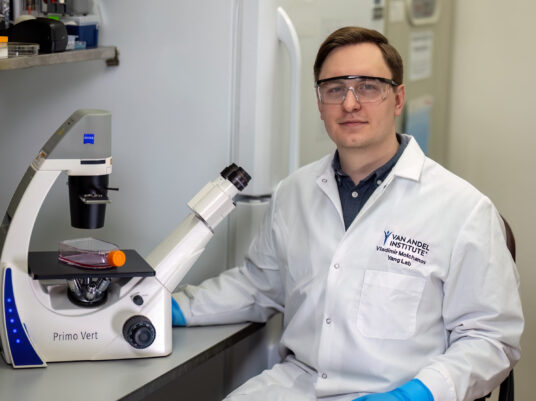Q&A with Vladimir Molchanov: Engineering Stem Cells for Targeted Osteoarthritis Therapy
February 12, 2024Vladimir Molchanov is a graduate student at the Van Andel Institute and a recipient of a 2023 Predoctoral Fellowship in Drug Delivery from the PhRMA Foundation.

Tell us a bit about yourself and how you became interested in biomedical research.
My mother initially inspired my excitement for biomedical research. As a physician, she has always been eager to talk to me about science and share her clinical perspective. This sparked my interest in biochemistry early in high school and later led me to enroll in an undergraduate program in biotechnology, where I found myself particularly excited about the potential of genetic engineering to revolutionize our therapeutic approaches. In my third year, I did a summer internship program at Caltech, where I realized how much I enjoy doing research, from planning and running experiments to seeing the results and discussing them with like-minded, enthusiastic people. A year later, I started my PhD journey at Van Andel Institute, an independent biomedical research institution focused on understanding disease mechanisms and exploring potential new treatments. I joined the lab of Dr. Tao Yang, where I’m currently developing targeted stem-cell-based therapeutic approaches for degenerative skeletal disorders.
Briefly describe your PhRMA Foundation-funded research project and its potential impact on patients.
The goal of my PhRMA Foundation-funded research project is to develop therapeutic options for osteoarthritis, a skeletal disorder characterized by loss of joint cartilage that results in swelling, pain, and loss of motion in the joints in millions of people worldwide. Most current treatments fail to restore the lost cartilage tissue and only temporarily alleviate these symptoms. A potential solution to this problem is to repair damaged cartilage by delivering stem cells, the building blocks of our tissues and organs, directly into the diseased joint through a simple injection. To make this approach effective, I am developing stem cells capable of locating damaged cartilage regions and forming new healthy tissue. These engineered stem cells hold great potential for providing millions of people with osteoarthritis with a minimally invasive and highly effective treatment option.
How will the PhRMA Foundation’s support impact your research and your career?
The PhRMA Foundation’s support impacts my career development in multiple ways. Firstly, the Predoctoral Fellowship in Drug Delivery is a highly prestigious award that emphasizes my commitment to finding novel therapies for people with osteoarthritis. Secondly, the PhRMA Foundation’s extensive social outreach initiatives and networking opportunities enable me to share my research with the public and establish connections with other experts in the field, fostering collaboration and contributing to the advancement of my work. Finally, the PhRMA Foundation’s communications and outreach training has enhanced my presentation skill set, and support from the Foundation enabled me to effectively advertise a Bioinformatics Workshop that I organized with a fellow graduate student last summer, which substantially enhanced my organizational and leadership skills.
What advice would you give to other young researchers, such as those applying for PhRMA Foundation awards?
Stay organized and actively communicate with your peers and mentors. As with many other things in research, fellowship application is a team effort that requires both individual initiative and collaboration. Establish a structured plan, set clear deadlines, and foster an environment where open communication flows. Seek feedback as often as possible and learn from it. This not only ensures that you meet key milestones but also allows you to refine your ideas as you grow into a complete scientist.
What are your future career aspirations?
Ultimately, I want to contribute to the development of cell-based therapeutic approaches that would one day enable us to cure diseases like osteoarthritis, Parkinson’s, or cancer. After completing my graduate studies, I want to gain experience in the cell and gene therapy industry as a postdoctoral fellow, and eventually lead my own research group working at the intersection of synthetic and cell biology.
Learn more about the PhRMA Foundation’s fellowship and grant opportunities.
Check out more researcher stories on our blog.
Photo credit: Van Andel Institute

